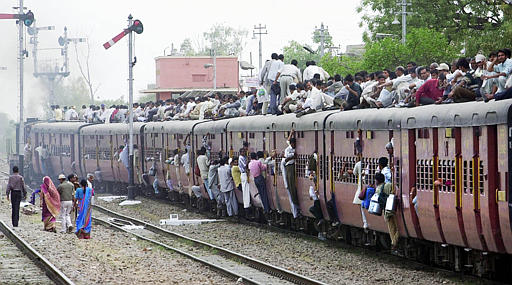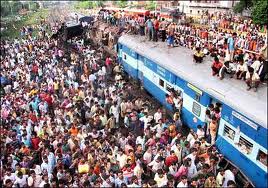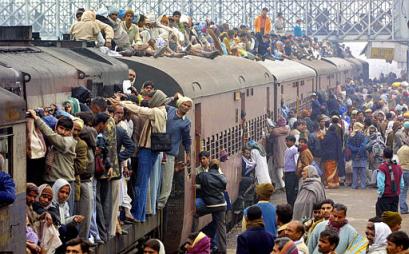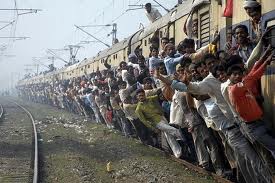HOT TOPICS
SPOTLIGHT AGENCIES
The way out for Indian Railways?
Written By murali772 - 19 March, 2012
Media Reports India Transportation public transport Indian Railways
Its (Indian Railways) size, and the advantages it enjoys as a monopoly, put it in a class of its own. It’s the world’s fourth largest network (in kilometres) after the US, Russia and China. It’s the envy of others, in terms of passengers and freight carried. But it is run, unlike IOC, ONGC etc, as a departmental activity. This has reduced it to the pitiable plight of Air India, another national treasure ruined by politicians. Indian Railways is the only PSU which has a minister presenting a separate budget of its own every year. This uniqueness has become a measure of deterioration over the years.
Perhaps the priorities got misaligned on account of what we inherited. There were 42 separate rail systems at the time of Independence. Railway Minister N Gopalaswamy Ayyangar, one of the ablest administrators India had known, focussed his skills on weaving the many companies into an integrated zonal grid. If he and Prime Minister Nehru had also thought of professionalising the network under an autonomous structure, the story would have been different.
- - - - In the hands of politicians, the Railways became a plaything to be tossed around and exploited for private gains. Lalu Prasad’s term, ironically, was noted for some significant progress. The reason was, he had neither the time nor the interest to pay any attention to the Railways. It was a time when Bihar politics was on the boil, and Lalu was straining every nerve to keep his hold. Politics in Patna so obsessed him, that he told a Railway ministry officer to run the show in Delhi. Untrammelled by politicians, the officer performed wonders.
- - - - It may be scary to look at the impossible crowds of humanity that throng into Mumbai’s suburban trains, or the concourses of Chennai Central and Howrah stations. But the overflowing multitudes also point to the size of the ‘market’. If only we had a professional set up that could efficiently manage this enormous potential—and the hundreds of station buildings that are real estate gold—the Railways could become a driver of India’s progress instead of the ignominy it is today.
To read the full column by Sri T J S George in the New Indian Express, click here.
This has perhaps to be the first and immediate step to get the Railways properly on track. But, even with autonomy, it is not as if there is no interference from the politicos. The way, the so-called autonomous PSU's listed by the author are operated, actually leaves a lot to be desired, and if they are still making profits, it is largely on account of the monopoly status enjoyed by most of them.
But, yes, it will certainly be an improvement over the present style of running it as a department of the government. As such, it needs to happen immediately. Further reforms can follow, as also for the other PSU's.
Muralidhar Rao
COMMENTS

kbsyed61 - 19 March, 2012 - 16:52
Murali,
Thanks for sharing this piece of article, even though the article tried to emphasis the fact that even the govt organizations/companies could do wonders provided they get the right leadership/management. That sentiments apart, it is no brainer or rocket science to comprehend the pathetic situation Indian railways is in today.
The article rightly points out the quagmire of Indian Railways - Most part its trains run full, it has the monopoly, It earns a great deal in freight and has potential to do more, but it is still year on year produces losses.




Photo Courtesy - asianinfrastructure.com, santoshrahul.blogspot.com, watblog.com
The main reasons for such a bad state of railways are:
- The management/operational structure has remained same as that was in 50s and 60s. The regional HQs are just like shift managers in an assembly or production line.
- Routes and services are determined not by demand or potential but by whims and fancies of politicians and Babus.
- With the leftist mindset, no significant attempt to bring in passenger amenities either in trains or in stations. Result, railways is relegated as transit mode for poor and lower middle class and positioned for class discrimination.
- No mood to tap the potential to increase revenues by venturing into commercial/logistic sectors and sub-urban transit systems.
- No stomach to even wish for better technology or expansion of platforms, stations - SWR has not added any new platform in last 20 years. SWR officials on record that they are satisfied with what they have and no desire for any expansion or improvements. RTI replies from SWR confirms this stand.
Looks like only we the Indians are capable to allow this to happen.

Cutting Railway into pieces ...
silkboard - 31 March, 2012 - 20:56
Don't think decentralization, cutting them into more zones etc. I am thinking cutting this beast called Railways into at least three separate entities is needed, because the business environment for them is different.
- Urban Commuter Rail Authority
- Railways, as it is today, focussed on inter-city services, including container/cargo
- High Speed Rail Authority. This one is already in place via an Act.
Urban Rail is a different beast, and Mumbai suburban rails distort railways passenger carried/earning numbers. This Urban Rail Authority would need tie ups with Metro Cities, and figure its own revenue and technology needs.
High speed rail too is a different beast, technology wise too, and target audience wise too.

Slice it using Konkan model or British Model
ramesh_mbabu - 1 April, 2012 - 16:11
http://en.wikipedia.org/wiki/Privatisation_of_British_Rail or http://en.wikipedia.org/wiki/Konkan_Railway. A closer look reveals that IR is in a state where BR was in 70s to 90s, be it functioning or the organizational structure. Currently the improved road infrastructure is taking the load from IR and even the govt. seems to encourage that through its own policies or lack of it.

abidpqa - 1 April, 2012 - 20:08
As a monopoly, the Railway has to provide service wherever there is need. They cannot deny a new train or route by saying it is not profitable. A legislated monopoly is the most profitable enterprise, nothing can be more profitable. Railways' working is not transparent. They will say a route is unprofitable for years, and nobody can question that. If a railway minister who is interested in that route comes, the route becomes suddenly profitable. (This also applies somewhat to BMTC.)
Some price control is also needed, which is best achieved in a monopoly. If the price is say RS. 3000 for second class ticket from Calcutta to Bangalore, how will people travel. Conact between different parts is import for more understanding and integration.

murali772 - 12 August, 2014 - 13:41
The agony of a Chennai-bound passenger bitten by a rodent in a sleeper class compartment on the overnight Salem-Chennai Express was compounded after railway authorities failed to provide him with first aid.
According to N P Venkatachalam (38), travelling to Chennai for a function in coach S6 with his friend on Friday night, he was bitten by the rat when he tried to remove his suitcase from under the lower berth around 10 pm. As he tried to kill it by covering it with a piece of paper, the rat bit him on the other hand as well and he started bleeding.
Venkatachalam said that he contacted the Travelling Ticket Examiner (TTE) and the railway police helpline who assured him that medical help would be provided when the train halted at Vridachalam Junction an hour later.
However, when the station authorities conveyed the lack of medicines, he filed a complaint with the station master, he said. There was no first aid provided on the train as well, he alleged. Bearing the pain all night, Venkatachalam got himself treated at a clinic in T Nagar on Saturday morning.
For the full text of the report in the New Indian Express, click here.
It all points once again to the dismal state of government monopoly services, and, with their occupying key infrastructural areas, the adverse impact they have on the quality of life of the aam aadmi.
The new government has been talking earnestly of outsourcing/ PPP/ privatisation, etc of railway services (as compared to lip services by earlier governments - check this). One desperately looks to their happening fast, and the improvements in the services thereof.
PRAJA.IN COMMENT GUIDELINES
Posting Guidelines apply for comments as well. No foul language, hate mongering or personal attacks. If criticizing third person or an authority, you must be fact based, as constructive as possible, and use gentle words. Avoid going off-topic no matter how nice your comment is. Moderators reserve the right to either edit or simply delete comments that don't meet these guidelines. If you are nice enough to realize you violated the guidelines, please save Moderators some time by editing and fixing yourself. Thanks!





